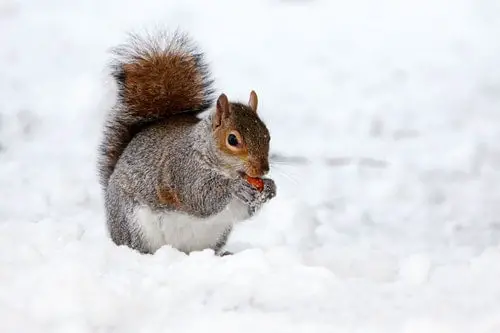The winter season can be very dangerous for plants and animals. The temperature drops below unsafe levels which can prove fatal to their survival. From food scarcity to limited mobility, animals grapple for every necessary means to survive the harsh weather conditions. Some are naturally endowed to survive this period, while others have to develop survival skills to brace the extreme cold temperatures.
So how do Squirrels stay warm in the winter? Squirrels, like other animals, also get busy preparing for the frigid temperature. You will not find a squirrel dormant when winter is approaching. Some species of squirrel have a great level of resistance against very extreme weather. You may begin to wonder how these little creatures survive harsh weather conditions. Do they rely on fat layers as most mammals do? Do they hibernate like bears? How are they designed? Here’s what I know:
How Squirrels Stay Warm In The Winter
Preparation For The Season
Yeah, that’s right. Squirrels, like other animals, prepare ahead for the winter season. Their bodies develop adaptability features as soon as they detect the slightest change in temperatures. Seasonal changes are tracked in all animals by the photo-neuroendocrine system (this is a collection of hormones, glands, and neurons that are intertwined to adjust our internal chemistry as day length changes). This mechanism helps to detect when there is a change in season and warns the body of impending temperature changes.
Almost all squirrel species get fattened during the fall. They grow extra layers of fat under their skin as a result of overfeeding during fall. This extra layer of fat is to serve as insulation against cold temperature during the winter, and as a reserve or much-needed energy when food shortage sets in due to restricted mobility.
Adaptability Skills
Surviving winter can pose to be a dangerous challenge for squirrels. If they do not adequately prepare and get everything right, it is very possible that squirrels can freeze to death when the temperature drops to extreme levels. Survival skills vary among different species, but there’s a common link to these. What squirrels do first is seek out shelter, a place of refuge when things get chilly:
-
Shelter
For humans, having shelter is synonymous with staying alive during the winter, and squirrels are no different. Ground squirrels would dig holes into the ground to serve as shelter. The flying species, grey and fox squirrels would naturally burrow holes through tree trunks to serve the purpose of shelter. After burrowing or digging, they would bring in dry leaves and layer up, which will serve as insulation for the cold. This shelter is known as a ‘den’.
Squirrels may live in groups in these underground shelters. The purpose of this is to warm each other up when it gets very chilly. Although, rarely, there may be a fight for territory, so the numbers allowed to stay inside a den are restricted. If you get very concerned about the squirrels living behind your house or abandoned shelter freezing to death, you can help them best by providing a warm den for their use. There are various nesting boxes for squirrels that are for sale at local stores. I’m very sure these tiny creatures would appreciate the gesture.
-
Food Store

Squirrels are naturally industrious animals. You will always find them roaming around, foraging for food to eat, and store. They dig up holes in the ground or in tree trunks, and in these holes, store a great quantity of food ranging from nuts to mushrooms, birds’ eggs, insects, animal bones, or anything that can serve them as food during winter. These holes may be close to their dens to allow for quick access or several holes, depending on availability and storage capacity. A single squirrel may dig several thousand holes to store food, while others may aggregate their efforts and create a communal hoard.
When winter sets in, they quietly visit their reservoir and feast on precious nuts. These food banks may serve the whole of winter. In other cases, squirrels periodically go out to search for food, no matter how extreme the weather is. You’ll always find one roaming around your lawn or at abandoned shelters scampering for food. However, the purpose of storing food is to limit the time they spend out in the cold foraging for food.
-
Body Features
As I earlier mentioned, squirrels feed a lot during the fall. This habit of overfeeding helps them grow extra layers of fat under their skin as winter approaches. This extra store of fat provides much-needed body insulation when it gets really cold. Body heat is preserved and does not escape through their skin.
Squirrels also grow longer, thicker coat when winter season in close. These new coats are naturally designed to reduce body heat loss and serve as insulators. Some species altogether alter the structure of their coats by absorbing more solar heat during winter. This thermoregulation allows them to produce more metabolic heat and regulate their body temperature. An example is the rock squirrel.
-
Shivers
Shivering sounds weird, right? Why would an animal shiver generate body heat? Well, here is why: Shivering is an auto reaction to cold temperature experienced by most animals. When squirrels shiver, it sends an instant response to their brain informing it of the temperature changes. The brain reacts by activating mechanisms used to generate body heat to insulate itself against the cold.
So yeah, squirrels shiver too, like most animals do, as a reaction to cold and as a defense mechanism to generate body heat.
Do Squirrels Hibernate?
Are Squirrels similar to bears as regards hibernation? Squirrels preserve energy and reduce mobility during winter by going into a modified form of hibernation called ‘Torpor’. Under this state, squirrels sleep for longer periods of time and only wake up about every ten days to warm themselves, eat, drink, and eventually return to sleep. Some species of squirrels are all-year rounders. They do not hibernate or Torpor. They are constantly active, foraging all the time.




